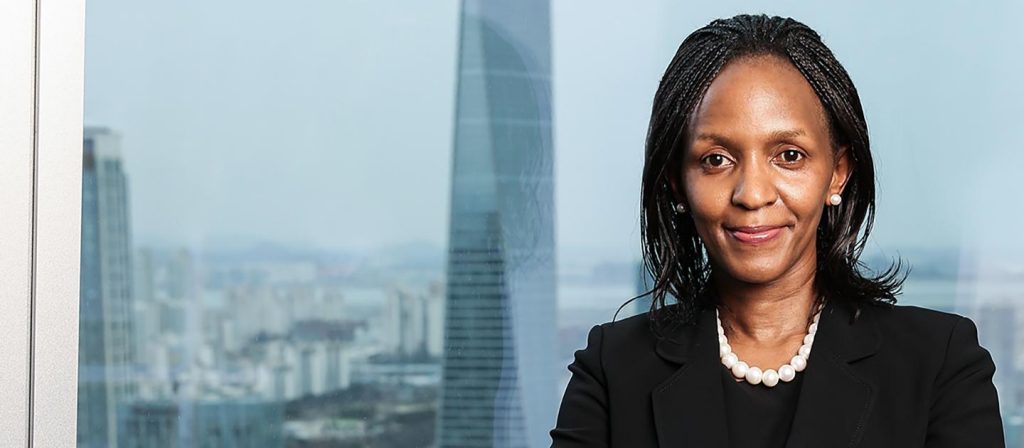The health and prosperity of humanity are directly tied to the state of our environment. We are at a crossroads. Do we continue on our current path, which will lead to a bleak future for humankind or pivot to sustainable development? That is the choice our political leaders must make, now, said Joyce Msuya, Acting Executive Director of the United Nations Environment Programme (UNEP) during the fourth UN Environment Assembly meeting held at the organizations’ headquarters in Nairobi, Kenya.
The 51-year-old Msuya is Tanzania’s top import to the global environmental organization.
Appointed 15 August 2018 by UNEP’s Secretary-General António Guterres, this mother of two initially served as an Adviser to the World Bank Vice President, East Asia and Pacific Region while based in Washington, D.C.
Not much is known about the private life of Msuya which is the testimony of how guarded she has been to date, avoiding personal scrutiny as she has steadily ascended the top global echelons.
Holding a Master of Science in Microbiology and Immunology degree from the University of Ottawa, Canada, and a Bachelor of Science in Biochemistry and Immunology from the University of Strathclyde, Scotland, Msuya also holds an Executive General Management Certificate from Harvard Business School (USA) and a Public Health Certificate from Johns Hopkins University (USA). Bottom line, she is solidly schooled.
Tellingly, within Africa’s patriarchal society, education acts as a catalyst, accelerating the pace of girls to tap into the mainstream marketplace and Msuya, a mother of two is certainly a typical symbol of this axiom.
Prior to joining UNEP Msuya served as an Adviser to the World Bank Vice President, East Asia and Pacific Region in Washington, D.C. She brought to the position more than 20 years of extensive experience in the field of international development spanning corporate, strategy, operations, knowledge management, and partnerships, with diverse assignments in Africa, Asia, and Latin America.
From 2014 to 2017, Msuya served as the inaugural World Bank Special Representative and Head of the World Bank Group (WBG) Office in the Republic of Korea, where she established and developed office operations. She led on expanding and deepening the partnership between the WBG and the Government of Korea.
Before this Msuya held a series of high-level positions at the WBG, including the World Bank Institute’s East Asia and Pacific Regional Coordinator based in China, Principal Strategy Officer at the International Finance Corporation (IFC)’s Manufacturing, Agribusiness & Services Department, and Special Adviser to World Bank Senior Vice President and Chief Economist, Lord Nicholas Stern.
At the WBG Msuya led several strategic initiatives within complex organizations at global, regional and country levels. These including ,creating an innovative blended finance fund , namely ,the Food Fund in response to the 2008 global food crisis; leading the development of the IFC’s growth strategy for Africa, which helped IFC achieve a historic increase in private sector investments in Africa; and managing the China-Africa Knowledge Sharing Program, the World Bank’s most successful South-South program, which leveraged the WBG’s environmental and social standards to inform sustainable business practices of cross border investments into Africa.
Before joining the World Bank Group in 1998, Msuya worked as an International Health Policy Analyst with the Liu Center for Global Studies, presently the Liu Institute for Global Issues at the University of British Columbia in Canada.
Previously she worked in Tanzania on various assignments, both in the private and public sectors
Msuya joined the World Bank in 1998 as a Health Specialist. She went on to build expertise in development economics as well as lending operations in the health sector during her tenure with the International Bank for Reconstruction and Development.In 2001, she joined the World Bank’s Development Economics Vice Presidency as Advisor to the Senior Vice President and Chief Economist, Professor Lord Nicholas Stern
From 2005 to 2011, she worked at the International Finance Corporation, in the Departments of Operational Strategy and Manufacturing, Agribusiness and Services, where she rose to the position of Principal Strategy Officer.
In 2011, she was assigned to the Beijing office of the World Bank Institute as Regional Coordinator for East Asia and the Pacific, focusing on support to the Bank’s operational work in its efforts to “fight poverty and promote shared prosperity”.
In April 2014, Msuya was selected by senior management to establish and manage the first World Bank Group office in Korea, serving for three years as the World Bank Special Representative to the Republic of Korea and Head of the World Bank Group Office based in Songdo, Incheon, South Korea.
At the time of her appointment to her present assignment, she served as an advisor for the World Bank’s Vice President for the East Asia and Pacific region, based in Washington DC.
And if her career trajectory so far is anything to go by, Msuya is slated to become a phenomenal figure with clout and influence in the globe.
On 15 August 2018, she was appointed to be the Deputy Executive Director of the United Nations Environment Programme (UN Environment) by United Nations Secretary-General António Guterres.
Mr Solheim announced he had quit with effect from November 20 in the wake of an internal audit report that said he had gobbled up $500,000 in unnecessary and budgeted travel expenses in just 22 months.
Ms Joyce Msuya was appointed by United Nations Secretary-General António Guterres to United Nations Environment Programme (UN Environment) on 15 August 2018.
Tanzanian national Joyce Msuya has been appointed as acting head of the United Nations Environment Programme (UNEP) after Erik Solheim, the executive director abruptly resigned on Tuesday in the wake of accusations of misuse of funds.
On 15 August 2018, she was appointed to be the Deputy Executive Director of the United Nations Environment Programme (UN Environment) by United Nations Secretary-General António Guterres.
Prior to joining UN Environment, Ms Msuya served as Adviser to the World Bank Vice President, East Asia and Pacific Region in Washington, D.C.
Ms Msuya however, wouldn’t find her new role a walk in the park especially coming in the wake of Solheim exit with the UN body attracting more scrutiny in the way it runs its affairs.
Mr Solheim announced he had quit with effect from November 20 in the wake of an internal audit report that said he had gobbled up $500,000 in unnecessary and budgeted travel expenses in just 22 months.
Prior to joining UN Environment, Ms Msuya served as Adviser to the World Bank Vice President, East Asia and Pacific Region in Washington, D.C. She brought to the position more than 20 years of extensive experience in the field of international development spanning corporate, strategy, operations, knowledge management, and partnerships, with diverse assignments in Africa, Asia, and Latin America.
From 2014 to 2017, Ms Msuya served as the inaugural World Bank Special Representative and Head of the World Bank Group (WBG) Office in the Republic of Korea, where she established and developed office operations. She led on expanding and deepening the partnership between the WBG and the Government of Korea.
Before this, Ms Msuya held a series of high-level positions at the WBG, including the World Bank Institute’s East Asia and Pacific Regional Coordinator based in China, Principal Strategy Officer at the International Finance Corporation (IFC)’s Manufacturing, Agribusiness & Services Department, and Special Adviser to World Bank Senior Vice President & Chief Economist (Lord Nicholas Stern).
At the WBG, Ms Msuya led several strategic initiatives within complex organizations at global, regional and country levels. These include:
- Creating an innovative blended finance fund (the Food Fund) in response to the 2008 global food crisis;
- Leading the development of the IFC’s growth strategy for Africa, which helped IFC achieve a historic increase in private sector investments in Africa; and
- Managing the China-Africa Knowledge Sharing Program, the World Bank’s most successful South-South program, which leveraged the WBG’s environmental and social standards to inform sustainable business practices of cross border investments into Africa.
Ms Msuya started her career with the WBG as Health Specialist, Africa Region in 1998. As an author and publisher of multiple articles in the health sector, including in peer-reviewed journals as well as a background paper titled “Making Services Work for Poor People” for the 2004 World Development Report (WDR), she delivered both sustainable development projects and leading analytical products.
Before joining the WBG, Ms Msuya worked on various public and private sector assignments at the University of British Columbia in Canada and in her native country of Tanzania.
Ms Msuya holds a Master of Science in Microbiology and Immunology from the University of Ottawa, Canada, and a Bachelor of Science in Biochemistry and Immunology from the University of Strathclyde, Scotland. She also holds an Executive General Management Certificate from Harvard Business School (USA) and a Public Health Certificate from Johns Hopkins University (USA). Ms Msuya is married with two children.
By Charles Wachira




